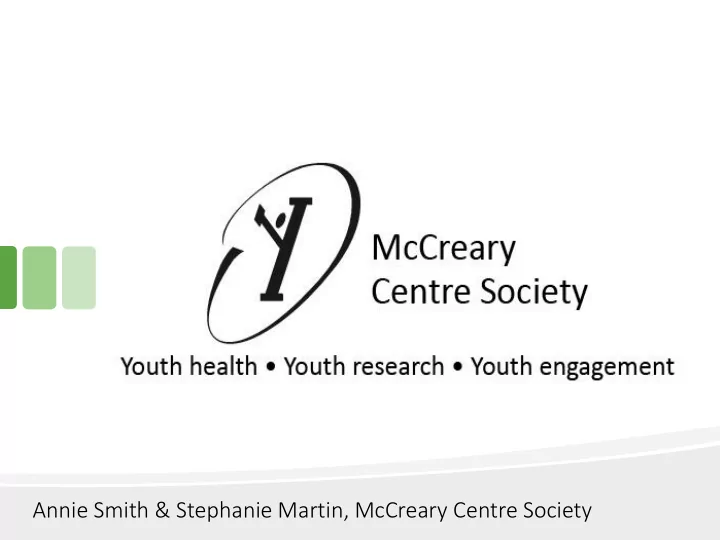

Annie Smith & Stephanie Martin, McCreary Centre Society
BC Adolescent Health Survey • 200,000 youth since 1992 • 58 of 60 SD in 2018 • Stakeholder consultations identified new and emerging issues
New items for 2018 • Resiliency • Time in nature • Subjective well-being • School commute • Medical marijuana • Online gambling • Quality of sleep • Online relationships • Indigenous language • Time off line
Need to get at poverty and deprivation • Parental income • Parental education and occupation • Access to computer • Family vacations • Sharing a bedroom • Going to bed hungry
Poverty and deprivation
Asked families about necessities for their children/youth • A warm winter coat • Daily fruit and vegetables • Books and indoor games at home • A hobby • A bike • Friends round for tea • Well fitting shoes
Missing Out: UK findings Asked youth how to measure deprivation. Themes: • Fitting in • Having fun • Building relationships 10-item index. Youth identify if they have the item, and if not if they want it.
Geographical difference
BC Index
Measuring deprivation Haida Gwaii
Measuring deprivation Prince Rupert
Measuring deprivation Burnaby
Measuring deprivation Vancouver
Deprivation Index • Money to spend on yourself • Clothes to fit in • Access to transportation • Smartphone • Lunch for school/money for lunch • Access to Internet • Space to hang out in • Equipment/clothes for extracurriculars • Money for school supplies, trips and extracurriculars • A quiet place to sleep
Piloting for 2018 Age of participants 27% 24% 22% 11% 9% 3% 2% 2% 12 years old 13 14 15 16 17 18 19 years or or younger older
Pilot results Don’t have Don’t have Item and don’t Have Ha Don’t know but wou bu ould lik like wan ant or or ne need Mon oney to o spe spend on on yourself 10% 3% 84% 3% Som Some spac pace of of your own to o han hang ou out in in 7% 1% 90% 2% Lun Lunch for or sch chool / mon oney to o bu buy lun lunch 5% 6% 87% 2% Clo lothes s in in or order to fit fit in in 5% 6% 85% 4% Sm Smartphone 5% 4% 91% 1% Mon oney for or sch school sup supplies, s, sch school trips, s, 4% 1% 93% 2% and to and o do do ext xtracurricular act activities Acc Access to o transportation 4% 1% 93% 3% Equ quipment/clothes you ne need to o do do 3% 10% 86% 2% extracurricular acti activities A A qu quiet pla place to o sle sleep 2% <1% 97% 1% Ac Access ss to o the Internet 1% 0% 98% 1%
Canada and UK deprivation index items Can Canada UK UK Money to spend on yourself Weekly pocket money Some space of your own to hang out in Garden or other safe outdoor space Lunch for school / money to buy lunch Monthly saving money Clothes in order to fit in Clothes to fit in with other young people Smartphone MP3 player (e.g., iPod) (2017: Smartphone) Money for school supplies, school trips, Annual holiday with family and to do extracurricular activities Access to transportation Access to family car Equipment/clothes you need to do Shoes, trainers or footwear to fit in with extracurricular activities other young people A quiet place to sleep Monthly day trips with family Access to the Internet Cable/satellite TV (2017: access to Internet TV (YouTube, Netflix)
Conclusion • Deprivation is a complex issue • Pilot shows the validity of developing a BC Deprivation Index • If you want to get it right ask young people
Thank you Annie Smith annie@mcs.bc.ca Stephanie Martin stephanie@mcs.bc.ca
Recommend
More recommend